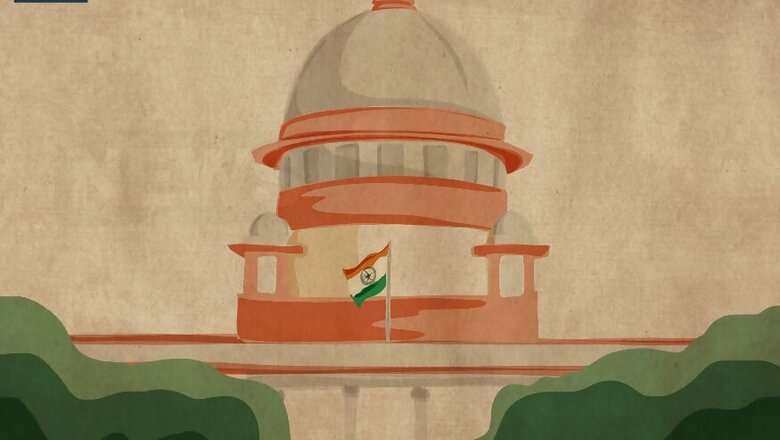
views
New Delhi: The Supreme Court on Tuesday fixed November 14 to commence hearing on a batch of petitions challenging constitutional validity of the Centre's decision to abrogate Article 370 that gave special status to Jammu and Kashmir.
A five-judge Constitution bench headed by Justice N V Ramana allowed the Centre and the Jammu and Kashmir administration to file counter-affidavits on petitions challenging scrapping of Article 370. The top court refused the plea of petitioners that not more than 2 weeks be given to the Centre and J&K administration for filing counter-affidavits.
The apex court also put embargo on filing of any fresh writ petition challenging constitutional validity on abrogation of Article 370. The bench said one week time would be for the petitioners to file their replies to the counter-affidavit that would be filed by the Centre and Jammu and Kashmir administration within four weeks.
"We have to allow the Centre and the J&K administration to file counter-affidavit otherwise we can't decide the matter," the bench also comprising justices S K Kaul, R Subhash Reddy, B R Gavai and Surya Kant said.
Chief Justice of India Ranjan Gogoi had on Saturday set up the Constitution bench to commence hearing on a batch of petitions challenging the scrapping of provisions under Article 370. It was decided on August 28 to refer them to a larger bench.
Several pleas have been filed in the top court challenging the Centre's August 5 decision abrogating provisions of Article 370 and bifurcating the state into Union Territories of Jammu & Kashmir and Ladakh. The UTs will come into being on October 31.
Advocate ML Sharma became the first petitioner in the case when he filed a petition in the apex court on August 6 challenging the presidential order on Article 370.
Later, several political parties including the National Conference (NC), the Sajjad Lone-led J&K Peoples Conference and CPI(M) leader Mohd Yousuf Tarigami filed pleas in this regard in the top court. The petition on behalf of NC was filed by Lok Sabha MPs Mohammad Akbar Lone and Justice (retd) Hasnain Masoodi. Lone is a former speaker of the J&K Assembly and Masoodi is a retired judge of the Jammu and Kashmir High Court.
In 2015, Justice (retd) Masoodi had ruled that Article 370 was a permanent feature of the Constitution.
Other pleas include the one filed by a group of former defence officers and bureaucrats. They have also sought directions declaring the presidential orders of August 5 "unconstitutional, void and inoperative".
The plea was filed by professor Radha Kumar, a former member of the Home Ministry's Group of Interlocutors for Jammu and Kashmir (2010-11), former IAS officer of J&K cadre Hindal Haidar Tyabji, Air Vice Marshal (retd) Kapil Kak, Major General (retd) Ashok Kumar Mehta, former Punjab-cadre IAS officer Amitabha Pande and former Kerala-cadre IAS officer Gopal Pillai, who retired as the Union home secretary in 2011.
A plea has also been filed by bureaucrat-turned-politician Shah Faesal, along with his party colleague and former Jawaharlal Nehru University Students' Union (JNUSU) leader Shehla Rashid.
During the hearing on Monday, the bench, also comprising Justices SA Bobde and SA Nazeer, said it has received a report from the Juvenile Justice Committee of the Jammu and Kashmir High Court on the allegations about illegal detention of minors in the Valley.
"The report has come. We will send this matter to the Kashmir bench (a three-judge bench headed by Justice Ramana)," the bench told the lawyer representing petitioners and child right activists Enakshi Ganguly and Shanta Sinha.
It also referred to the three-judge bench a separate plea filed by a doctor who claimed shortage of medical facilities in Kashmir due to the restrictions imposed there and also about restoration of internet facilities in the hospitals there.
The bench said that petition filed by Executive Editor of Kashmir Times Anuradha Bhasin, who has raised the issue of restrictions imposed on working of journalists in Kashmir following the abrogation of provisions of Article 370, would be heard by the three-judge bench.
It also referred the separate petitions, including those filed by CPI(M) general secretary Sitaram Yechury and senior Congress leader Ghulam Nabi Azad, to the three-judge bench.
While Yechury has filed a petition seeking permission to visit his party colleague Yousuf Tarigami in Kashmir, Azad has moved the top court in his personal capacity seeking its nod to visit his family members and relatives in Kashmir.
The apex court had earlier allowed Yechury to visit Kashmir to meet Tarigami while Azad was also permitted to visit four districts — Srinagar, Jammu, Baramulla, Anantnag — to meet people.
Other pleas, which would be taken up for hearing by the Constitution bench, include the one filed by a group of former defence officers and bureaucrats who have sought direction to declare the Presidential orders of August 5 "unconstitutional, void and inoperative".
The plea was filed by professor Radha Kumar, a former member of the Home Ministry's Group of Interlocutors for Jammu and Kashmir (2010-11), former IAS officer of J&K cadre Hindal Haidar Tyabji, Air Vice Marshal (retd) Kapil Kak, Major General (retd) Ashok Kumar Mehta, former Punjab-cadre IAS officer Amitabha Pande and former Kerala-cadre IAS officer Gopal Pillai, who retired as the Union home secretary in 2011.
The NC leaders have submitted that the Presidential Orders paved the way for application of entire provisions of the Constitution in Jammu and Kashmir and also have the effect of nullifying Article 35A and completely abrogating Article 370.
They have contended that the Presidential Orders and the new legislation unconstitutionally undermine the scheme of Article 370.

















Comments
0 comment